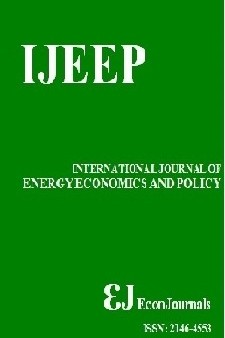Strategic Alliance in Energy Sector & Implications for Economic Growth and Technical Efficiency: The Case of Petrobras and Galp
Strategic Alliance in Energy Sector & Implications for Economic Growth and Technical Efficiency: The Case of Petrobras and Galp
- Başlangıç: 2011
- Yayıncı: İlhan ÖZTÜRK
Energy Integration in European Power Sector
Wadim STRİELKOWSKİ, Michal MİRVALD, Michael PEDERSEN
The Nexus between Electricity Consumption and Economic Growth: New Insights from Meta-Analysis
Jamal BOUOIYOUR, Refk SELMI, İlhan OZTURK
Oil Price Pass-Through into Domestic Inflation: The Case of Iran
Abbas Ali ABOUNOORİ, Rafik NAZARİAN, Ashkan AMİRİ
Some Evidence on the Asymmetry between Gasoline and Crude Oil Prices in Selected Countries
Changing Patterns of Electricity Usage in European Manufacturing: A Decomposition Analysis
Analysis of the Energy Market Operator Activity in Eight European Countries
France KRİŽANİČ, Zan Jan OPLOTNİK
International Energy Security Indicators and Turkey’s Energy Security Risk Score
Economical Considerations on CCS System for Geological Uncertainty and Injection Failure
Haruhiro SUZUKİ, Amin YOUSEFİ-SAHZABİ, Yuichi SUGAİ, Hossein YOUSEFİ, Kyuro SASAKİ
Economic Evaluation of Climate Protection Measures in Germany
Christian LUTZ, Ulrike LEHR, Philip ULRİCH
Yusuf Opeyemi AKİNWALE, İbikunle Olalekan OGUNDARİ, Oluwatosin Eniola ILEVBARE, Adeyemi Oluwaseun ADEPOJU
